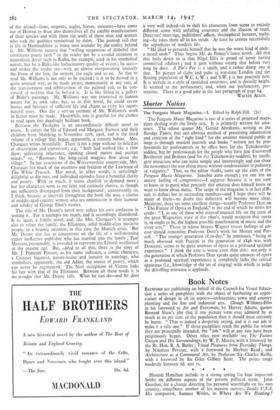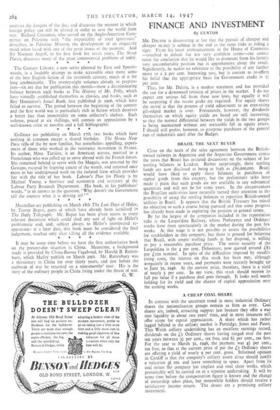Book Notes
BATSFORD are publishing on behalf of the Council for Visual Educa- tion a series of pamphlets with the object of furthering an appre- ciation of design in all its aspects—architecture, town and country planning and the fine and industrial arts. Clough Williams-Ellis in his foreword to Art and Everyman, by Hervey Adams, quotes Bernard Shaw's jibe that if any picture were ever admired by as much as to per cent, of the population then it should most certainly be burnt. "That is indeed a desperate saying, and it is our job te make it a silly one." If these pamphlets reach the public for whom they are principally intended, the "job" will at any rate have been propitiously begun. Other titles now available are The Future Citizen and His Surroundings, by W. F. Morris, with a foreword by the Rt. Hon. R. A. Butler ; Visual Pleasures from Everyday Things, by Nikolaus Pevsner, with a foreword by Herbert Read ; and Architecture as a Comniunal Art, by Professor Sir Charles Reilly, with a foreword by Sir Giles Gilbert Scott. The prices range modestly between 6d. anci TS.
* * *
Hamish Hamilton include in a strong spring list four important books on different aspects of the present political scene. John Gunther, for a change directing his personal searchlight on his own country, contributes another of his massive surveys, Inside U.S.A. His compatriot, Sumner Welles, in Where Are We Heading ? analyses the dangers of the day, and discusses the manner in which foreign policy can still be altered in order to save the world from war. Richard Grossman, who served on the Anglo-American Com- mittee on Palestine with "the impartiality of total ignorance," describes, in Palestine Mission, the development• of an enquiring mind when faced with one of the great issues of the moment. And Sir Norman Angell, in his first book for seven years, The Steep Places, discusses many of the great controversial problems of today.
The Century Library, a new series planned by Eyre and Spottis- woode, is a laudable attempt to make accessible once more some of the best English fiction of the twentieth century, much of it for long unobtainable. The twenty-eight volumes already in prepara- tion—six are due for publication this month—show a discriminating balance between such books as The History of Mr. Polly, which have virtually established themselves as classics, and books, such as Roy Horniman's Israel Rank, first published in 1906, which have failed to survive. The period between the beginning of the century and the first world war is particularly rich in fiction which deserves a better fate than immortality on some collector's shelves. Each volume, priced at six shillings, will contain an appreciation by a well-known critic or novelist and a full bibliography.
Gollancz are publishing on March 17th two books which have nothing in common except a shared birthday. The House Near Paris tells of the by now familiar, but nonetheless appalling, experi- ences of those who worked in the resistance movement in France. Its author, Mme. Tartiere, is an American actress, married to a Frenchman who was called up to serve abroad with the French forces. She remained behind to serve with the Maquis, was arrested by the Gestapo, escaped by feigning cancer of the womb, and returned once more to her underground work on the isolated farm which provides her with the title of her book. Labour's Plan for Plenty is by Michael Young, a barrister and economist and secretary of the Labour Party Research Department. His book, in his publishers' words, "is an answer to the question, 'Why doesn't the Government tell the country what it is driving at?
Macmillan are publishing on March r8th The Last Days of Hitler, by Trevor Roper, parts of which have already been serialised in The Daily Telegraph. Mr. Roper has been given access to every relevant document which could shed any sort of light on Hitler's problematic end, and, subject always to Hitler's unexpected re- appearance. at a later date, this book must be considered the final judgement, reached only after sifting all the evidence available.
It may be some time before we have the first authoritative book on the present-day situation in China. Meantime, a background study is provided by China-Burma Vaggbond, by Harold B. Ratten- bury, which Muller publish on March 20th. Mr. Rattenbury was a missionary in China for over thirty years, and just before the outbreak of war he returned on a nine-months' tour. His is the story of the ordinary people in China living under the threat of war.
G. W.



































 Previous page
Previous page